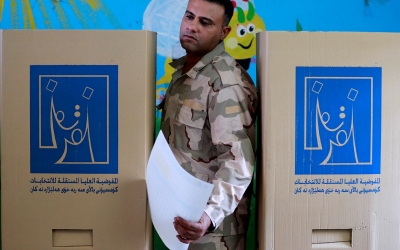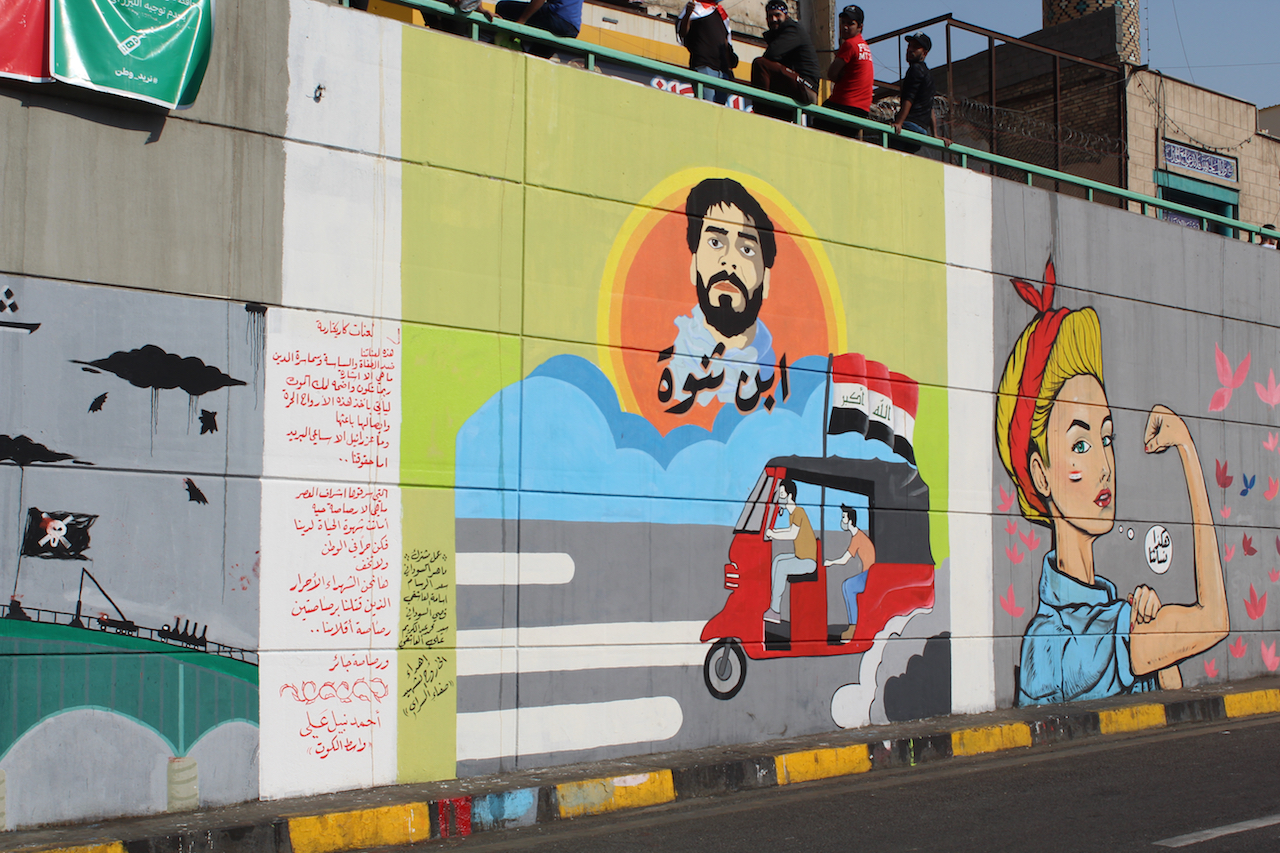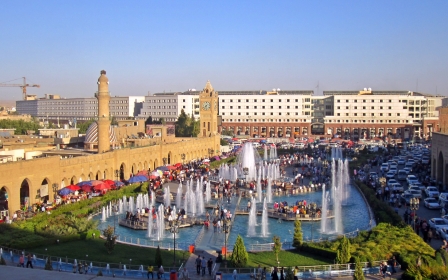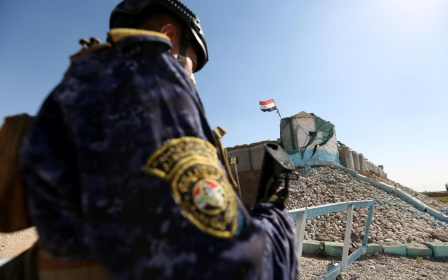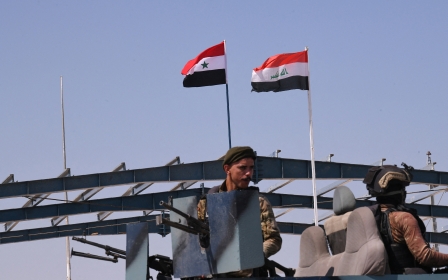Iraq elections: Accusations fly as fractured Tishreen movement seeks votes
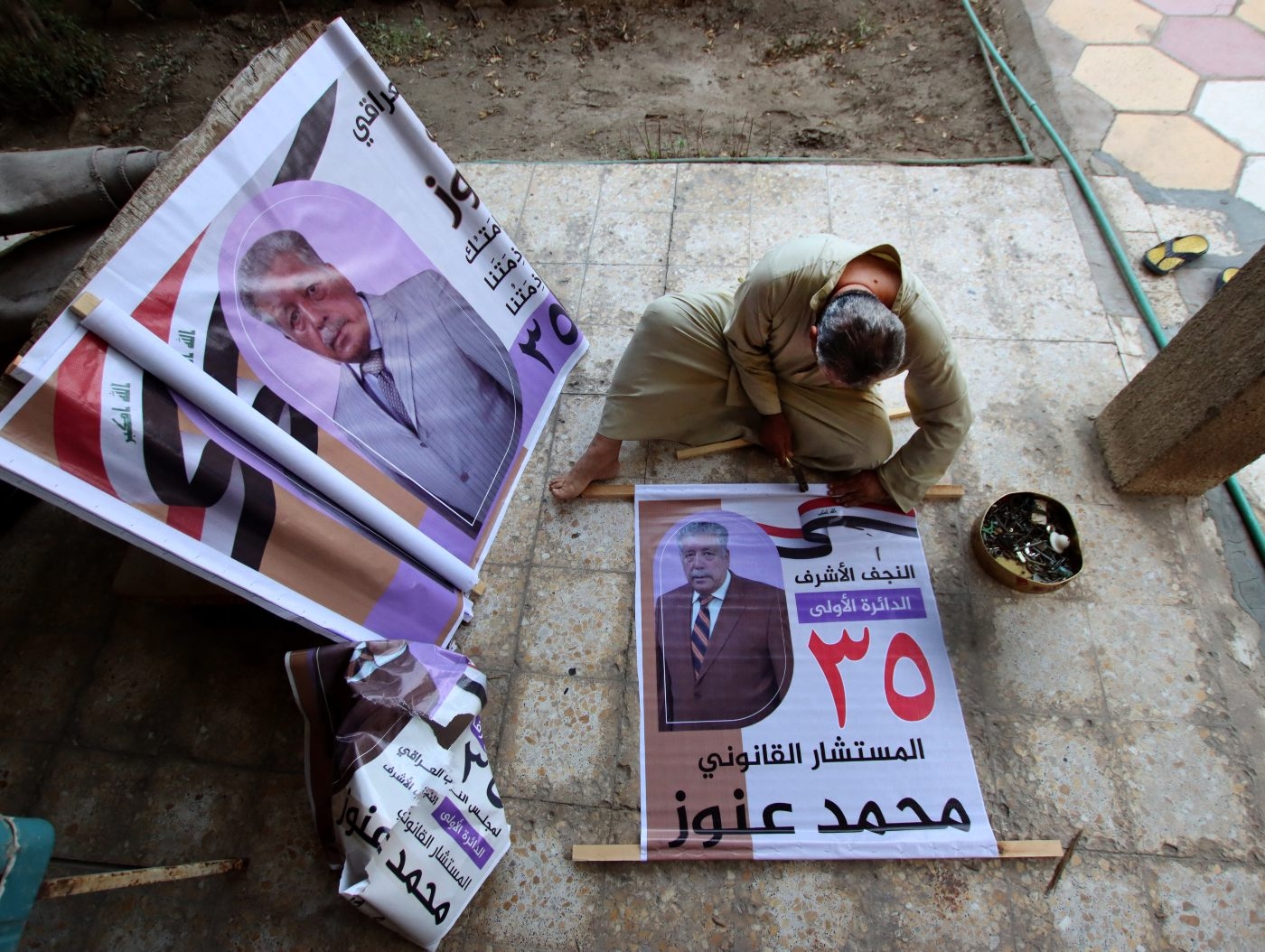
Amir struggles through tears as he shows, on his phone, the video of his brother Anmar’s untimely and violent death.
Anmar was taking part in Iraq's October 2019 protests (referred to as the Tishreen movement, the Arabic word for October) that sought to unseat what was seen as an intrinsically corrupt political class and secure a brighter future and employment for Iraqi youth.
The video shows Anmar being struck in the head by a tear gas cannister - a heavy-duty make possibly imported from the Balkans and banned throughout much of the world - which embeds in his cranium, as he falls to the floor with gas still spewing from the wound.
“He wanted his country,” said Amir, speaking to Middle East Eye in a cafe in Baghdad, the street outside dotted with banners, flags and posters of political candidates for Sunday's parliamentary elections.
“They (the politicians) stole Iraq away from us. They’re mafias, they’re sucking all the wealth of Iraq and transferring all the money abroad.”
Hundreds of people - Amir said he believed it to be more than a thousand - have died in the more than two years since the Tishreen protests began, either from the weapons of the security forces or through assassination by shady armed groups.
Unlike many other protesters, however, Amir has chosen an alternative route to justice for his murdered relative.
Since April, he and four other Iraqis have been applying through the French courts to prosecute former Prime Minister Adel Abdul Mahdi, who is believed to still hold French citizenship.
“We’re waiting to see if the case will be accepted by the court in France. Even failing that, the defence minister has Swedish citizenship, so we still have other options,” he explained.
Threats
Despite more than a year's worth of promises from the current prime minister, Mustafa al-Kadhimi, Amir is resigned to the fact that there will be no mechanism for achieving justice for his brother in Iraq.
He is committed to his struggle, but like many Tishreen supporters (known as Tishreenis) it has made his life increasingly dangerous. He said at one point he was contacted by someone who offered him money to drop the case against Abdul Mahdi, or else he “may get hurt here.”
Other claimants in the French case received similar threats, leading to at least one fleeing the country.
Amir cited the case of analyst Hisham al-Hashemi and activist Ihab al-Wazni as evidence that political killings can be carried out in Iraq with little or no consequences.
'The Tishreenis, they are all simple people who just want to live. I don’t think any true candidate has emerged'
- Amir, brother of slain protester
“We don’t feel safe, but really hundreds have died, so we are not much different from those. We should keep going and let the world know what happened,” he said. “I don’t mind being killed and buried next to my brother.”
In Amir’s view, the entire system in Iraq is irredeemable. Like millions of other Iraqis, he plans to boycott Sunday’s elections. He said that he did not even want to make the effort to spoil his ballot as he feared that it would be manipulated.
Amir also has no time for the candidates running under the Tishreen banner in the elections, and has no faith that they can influence the system from within. Like many, he believes those standing for election who are supposedly representing the protesters have been bought off.
“When the protests happened the political parties infiltrated the protesters… the Tishreenis, they are all simple people who just want to live. I don’t think any true candidate has emerged, they all have political ties.”
Differences among activists
Few would deny that the Tishreen protests have had an impact on Iraqi politics, even if they never achieved their principle aim of entirely culling the Iraqi political class.
Sunday’s elections are set to be held under a new electoral system that will see the number of electoral districts increased to 83, rather than the 18 in previous elections. Districts will now vote for individuals rather than parties, though candidates still have party backing, unless they stand as independents.
The change was a key demand of the Tishreen protesters, though it never quite went as far as they wanted. “We were aiming to have a political candidate system, not lists of political parties,” said Ali Khrypt, who said he wanted a system where “each candidate stands under his own name”.
“But the Sadrists in particular, they insisted on having these multi-zones of voting. That was their demand, they kept working on it and they got it," he said, referring to the followers of the influential cleric Muqtada al-Sadr and the fudge which eventually saw the electoral law dividing districts along the establishment parties' spheres of influence.
A filmmaker and established political activist, Khrypt was a close friend of Safaa al-Saray, who became the face of the Tishreen movement after he was killed by a tear gas cannister on 28 October 2019, during a protest.
Saray's image now adorns walls, banners and social media across Iraq despite attempts by opponents to smear him. These attempts have included spreading around a Facebook picture of him and Khrypt sharing a bottle of whisky.
Khrypt said that he had “differences” with those among the Tishreenis now taking part in the elections.
“When we were back in the protest yards, we didn’t get along. Also among them, it was a bit chaotic – they were not harmonious or homogenous,” he explained.
“Personally, I think everybody should boycott. Boycotting will not give a solution and voting will not give a solution either, but boycotting will personally make me feel better.”
The development of parties from the Tishreen movement has provoked enormous controversy among activists: for some, agreeing to work within the hated political system is tantamount to betrayal or, at the very least, opening the movement up to being co-opted.
For others, it’s simply common sense. What, after all, was the point in the seminars, discussions, protests and literature that came from the movement if not to put it towards political action?
Against 'sudden change'
There are divisions even among those willing to take part in the elections.
Zulfiqar Hussein Ali and Mashreq Al-Fraiji are running under the Tishreen banner as part of the National State Forces Alliance and Nazil Akhoth Haqqi (I'm Going to Take My Right) respectively.
The former movement is a coalition formed by former prime minister Haider al-Abadi and Shia cleric Ammar al-Hakim. While both men are often branded with the “moderate” epithet, they are still political veterans in Iraq, and working with them is a red line for many Tishreenis.
Hussein Ali said that the protesters needed to be realistic about the framework they were operating in. For all the talk of revolution he said that "sudden change" had generally been bad for Iraq, citing the country's numerous coups and the 2003 invasion.
'The established political groups exist on the ground. They rule the country. So you have to deal with them. You have to deal with reality'
- Zulfiqar Hussein Ali, National State Forces Alliance
As such, it was necessary to be pragmatic and work with those whose hands were less tainted. "The established political groups exist on the ground," he argued. "They rule the country. So you have to deal with them. You have to deal with reality."
Nazil Akhoth Haqqi, on the other hand, is unwilling to work with establishment parties, instead attempting to forge alliances with other pro-Tishreen groups.
Fraiji said he and four other political entities had on Monday agreed to forge a political front that would constitute around 100 candidates in the elections.
"We think that by taking part in the elections we will be able to have legal representation in order to protect those people who were part of the Tishreen protests," said Fraiji.
"This way, we get seats in the parliament, use those seats to establish work to interact with the public and increase our public support, the number of our followers."
He added that they would not abandon their fellow Tishreenis "even if they speak against us". "As long as they are Tishreenis, we will help them all we can and protect them," he said.
Surfer Sadr
The expectation is that the major winner of Sunday's elections will be Sadr, who commands a movement of millions of people, largely among the poor and working-class.
Sadr has long been seen as a chameleon. Opponents have in the past posted pictures of him riding a surfboard, accusing him of “riding the wave” of whatever happens to be the dominant trend in Iraq.
In the 2018 elections, he allied with the Communist Party and established himself and his movement as an anti-corruption force and an opponent of Iranian influence in Iraq. His supporters could be heard chanting “Iran is out, Iraq is free" following initial results showing his Sairoun political movement leading the vote.
He has also attempted to ride the wave of the anti-government movement. In 2016, his followers poured into the then largely secular civil society-led anti-government demonstrations, a feat he again performed in October 2019.
Not long after that, he turned on the movement, accusing them of "immorality" and ordering his supporters to break up the numerous protest camps across the country. Such experiences have engendered a cynicism and scepticism among many Tishreenis about involvement in electoral politics.
'You cannot just be a revolutionary'
The organisational ability of the Sadrists and the other established political parties is another factor in their repeated success.
Kamal Jabir, a veteran political activist with the secular Civil Democratic Alliance and opponent of former ruler Saddam Hussein, said the Tishreen movement was simply too divided at this stage to succeed and had lost its chance to influence the election.
"For Tishreen youths - two years ago, I wasn't able to blame them. For them this was their first experience, they weren't members of political parties," he said.
"And they kept making mistakes, refusing to form political parties, refusing to even use the word 'politics' and I kept telling them you cannot just be a revolutionary. You have to plan, you have to have a map."
Amir is still especially cautious. Though he has no plans to leave Iraq, he is keeping much of his identity and where he currently lives under wraps. Though a confluence of events ended up stalling the anti-government movement, he sees things in a wider perspective.
“Iraq is an 8,000 year-old civilisation, and they have always had rebellions and revolutions, and they don’t accept injustice and oppression," he said.
Would Iraqis return to the streets if the election fails to satisfy their ambitions? “For sure.”
Middle East Eye delivers independent and unrivalled coverage and analysis of the Middle East, North Africa and beyond. To learn more about republishing this content and the associated fees, please fill out this form. More about MEE can be found here.


